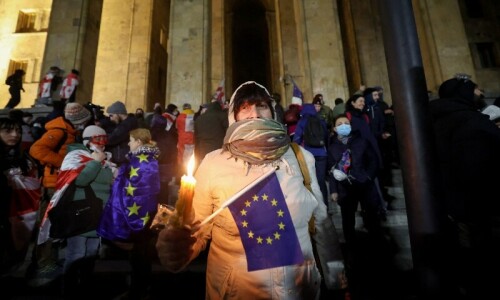PARIS: Chad announced on Thursday that it had decided to end military cooperation with France, wrongfooting the African country’s former colonial masters and adding to a series of French setbacks in the Sahel.
N’Djamena’s statement declaring its “decision to end the accord in the field of defence” came only hours after a visit by French Foreign Minister Jean-Noel Barrot, whose delegation was clearly unaware of the statement about to be made.
“You could describe this as a slap in the face,” said Wolfram Lacher, a researcher at the German Institute for International and Security Affairs (SWP).
The announcement by Chad _ the last Sahel country to host French troops _ came shortly after Senegal’s President Bassirou Diomaye Faye indicated in an interview that France should close its military bases in that country.
“First Senegal, then Chad, within 24 hours,” Lacher said. “That shows the failure of France’s policy in Africa.” The French government had yet, as of Friday afternoon, to make an official comment on the development.
Paris has been preparing for years what it called a “reorganisation” of military relations after the forced departure of French troops from Mali, Burkina Faso and Niger where regimes hostile to France have taken hold.
On Monday, President Emmanuel Macron’s special envoy for Africa, Jean-Marie Bockel, submitted him a report on reshaping France’s military presence in Africa, calling for a partnership that was to be both “renewed” and “co-created”.
The report “recommended a drastic reduction” of France’s military presence, noted Elie Tenenbaum, at the France’s Institute for International Relations (IFRI).
Faster than the French
But its conclusions left Chad dissatisfied, because they “failed to take into account their expectations”, said Yamingue Betinbaye, a political analyst in Chad, adding it might have triggered Thursday’s abrupt announcement.
“Once again, the Africans moved faster than the French,” said Tenenbaum, adding that their method had also handed a public relations victory to Russia, which has been expanding its influence in Africa.
“Both Chad and Senegal have been intensifying contacts with Russia in recent months,” Tenenbaum said.
While neither country represents a strategic priority for Moscow, “it’s a good way to land a blow against the French”.
A blow that stings all the more given that Macron and Chadian President Mahamat Idriss Deby Itno had agreed only last month to “strengthen cooperation” between both countries.
“A page has been turned” after years of military cooperation, said Lacher, noting that France had “saved” the current president’s late father and predecessor, Idriss Deby, “several times” when he was under threat of losing power.
Lacher said there had been “no need whatsoever” for Chad’s leader to cancel the arrangement with France, adding: “His position with Paris was comfortable.” Analysts say recent events point to France’s difficulties as it seeks to emerge from the deadlock created by its cancellation of the contingent in the Sahel in 2022, and as it faces a wave of anti-French sentiment on the continent.
In January Thierry Burkhard, French armed forces chief, acknowledged that France’s military presence in Africa was creating “negative perceptions that end up outweighing the positive effects”.
France, he recommended, should allow sovereign African partner nations “to communicate about their own actions”
Published in Dawn, November 30th, 2024













































Dear visitor, the comments section is undergoing an overhaul and will return soon.